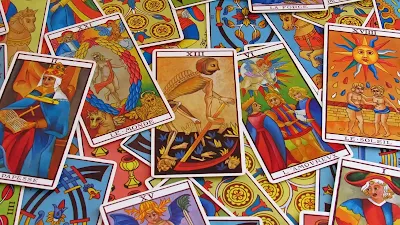Is the Tarot right?
The Tarot, with its mysterious cards adorned with symbolism and vibrant colors, has fascinated people of various cultures and eras.
Many turn to this form of divination in search of answers to questions about love, work, health, and the future in general. However, the question remains: is the Tarot right?
See Why is your horoscope always right?
 |
| Is the Tarot right? |
History of Tarot: more than cards on the table
The exact origin of the Tarot is a mystery, but it is believed to have developed in northern Italy in the 15th century. Initially, Tarot cards were not linked to divination, but were used as a card game. It was in the 18th century that the Tarot became most closely associated with divination, thanks to the rise of esotericism and symbolic interpretation.
The Tarot consists of 78 cards, divided into the Major and Minor Arcana. The Major Arcana represent universal archetypes, while the Minor Arcana are more like a standard set of cards, divided into four suits. The interpretation of these cards varies depending on tradition and the Tarot reader.
Tarot mysticism: how does it work?
The practice of Tarot is based on the belief that the cards act as a channel for spiritual energy or the collective unconscious. Tarot readers, or tarotists, use their intuition and symbolic knowledge to interpret the cards and provide information to the reader.
Some believe that the Tarot has a metaphysical component, connecting readers with cosmic or spiritual forces. Others maintain that Tarot is a powerful psychological tool that can help access the unconscious and inner wisdom.
Science and the tarot: a skeptical perspective
From a scientific perspective, the Tarot faces skeptical scrutiny. The lack of solid empirical evidence to support the effectiveness of Tarot as a predictive tool has led many to consider it a practice based on suggestion and subjective interpretation.
Critics argue that Tarot interpretations are general enough to apply to a wide variety of situations, making it easier for clients to find meaning in the readings. Furthermore, they point out that the lack of a consistent framework for interpreting the letters allows for wide personal interpretation on the part of readers.
The placebo effect and personal interpretation
The placebo effect could play a significant role in the apparent effectiveness of Tarot. When people seek answers to important questions in their lives, they may be more open to suggestion and prone to finding meaning in Tarot readings, even if the interpretations are vague or generalized.
Personal interpretation also plays a crucial role in the Tarot experience. Readers can offer unique perspectives and valuable advice based on their own experience and knowledge. However, this can also lead to bias and subjectivity in the readings.
So, is the tarot right?
The question of whether Tarot "gets it right" is complex and depends largely on individual perspective. For some, Tarot readings have provided clarity, comfort, and guidance at crucial times. Others see it as a form of entertainment or personal exploration, without attributing real predictive value to it.
It is important to note that Tarot cannot predict the future infallibly. Instead, it offers a lens through which clients can reflect on their current situation and explore possible future paths. The true usefulness of Tarot may lie in its ability to encourage reflection, self-exploration, and personal development.
Conclusions: beyond the cards
The Tarot is ultimately a symbolic tool that has captured people's imaginations for centuries. Whether we view it as an esoteric practice with mystical roots or as a method of psychological introspection, Tarot offers a space for reflection and contemplation.
Although science does not support Tarot's ability to foresee the future, its power lies in its ability to spark meaningful conversations about our lives and our choices. Ultimately, the question of whether the Tarot "gets it right" may not have a definitive answer, since its value lies in personal interpretation and the richness of meanings that each individual finds in their cards.




Comments
Post a Comment